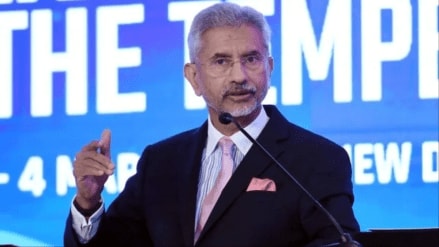External Affairs Minister S Jaishankar’s upcoming visit to Pakistan on October 15-16, 2024, for the Shanghai Cooperation Organisation (SCO) Heads of Government meeting, holds significant diplomatic weight amidst rising regional tensions.
However, this visit will not serve as a platform for India and Pakistan to discuss bilateral issues, as Jaishankar has clearly stated that the focus remains on the SCO’s multilateral agenda.
This visit marks the first by an Indian Foreign Minister to Pakistan in nearly a decade, but Jaishankar’s stay is expected to be brief – less than 24 hours, reflecting the restrained nature of Indo-Pak relations. Despite the charged political atmosphere, the visit is centered around the SCO’s broader mandate of regional cooperation and not on resolving the strained ties between India and Pakistan.
The SCO’s Importance: A Platform for Multilateral Dialogue
The Shanghai Cooperation Organisation, founded in 2001, aims to foster political, economic, and security cooperation in the region. Its members include major powers like China, Russia, India, and Pakistan, as well as several Central Asian nations. The SCO summit provides a crucial platform for these countries to engage in discussions on multilateral issues, including regional connectivity, counterterrorism, and economic collaboration.
Jaishankar stressed this focus ahead of his visit, stating, “I’m not going there to discuss India-Pakistan relations. I’m going there to be a good member of the SCO.” His comment reflects India’s commitment to the SCO’s objectives, despite the complicated relations with Pakistan.
Experts suggest that India’s priority at the summit will be to contribute to discussions on regional security, trade, and connectivity, particularly in light of the rapidly evolving geopolitical landscape in Central Asia.
Bilateral Meetings: Unlikely but Crucial
While the SCO summit is intended to foster cooperation among its member states, there is considerable speculation about potential bilateral meetings between Indian and Chinese officials on the sidelines of the event. Relations between India and China have been strained due to the ongoing military standoff at the Line of Actual Control (LAC), and Jaishankar’s visit could set the stage for further diplomatic engagement.
However, Pakistani Foreign Minister Ishaq Dar has ruled out the possibility of a bilateral meeting between India and Pakistan during the summit. “India’s Foreign Minister has not asked for any meeting, and we haven’t requested a bilateral meeting either. He will come as a guest for the SCO, and discussions will be held on multilateral issues,” Dar said, dismissing speculation of an Indo-Pak thaw.
Despite the lack of bilateral talks, the presence of leaders from China, Russia, and other Central Asian nations at the summit suggests that regional security and connectivity will dominate discussions.
Pakistan’s Security Concerns Amid Political Instability
As Pakistan prepares to host the SCO summit, the country is grappling with significant internal security challenges. The Punjab government has imposed Section 144 in Rawalpindi until October 17 to ensure law and order during the summit. This move reflects the heightened security concerns, particularly as former Pakistani Prime Minister Imran Khan remains imprisoned, fuelling political tensions. Khan’s supporters have been barred from meeting him, and the opposition party Pakistan Tehreek-e-Insaf (PTI) has threatened large-scale protests.
Prime Minister Shehbaz Sharif’s government has deployed thousands of security personnel in Islamabad, and restaurants, cafes, and other public venues in the capital have been ordered to close during the summit. These measures highlight Pakistan’s determination to project stability during the high-profile event. However, the volatile political climate in the country remains a concern, with ongoing protests and potential clashes between PTI supporters and law enforcement agencies casting a shadow over the summit.
Focus on Multilateralism: Connectivity, Energy, and Security
Despite the political and security challenges, the SCO summit is expected to focus on key multilateral issues. One of the central themes will be regional connectivity, with discussions likely to include road and rail linkages between member states. While Pakistan has previously explored initiatives like the Turkmenistan-Afghanistan-Pakistan-India (TAPI) gas pipeline, such projects are unlikely to be directly addressed at the SCO meeting. Instead, broader discussions on enhancing regional trade and infrastructure development will take center stage.
Counterterrorism is another critical issue on the SCO’s agenda, particularly in the context of the ongoing instability in Afghanistan and the rise of extremist groups in the region. As one of the key members of the SCO, India is expected to highlight the need for enhanced counterterrorism cooperation, especially in light of recent global developments. The summit also provides an opportunity for India to engage with Central Asian nations on economic partnerships and energy security, areas where collaboration has grown in recent years.
The Future of Indo-Pak Relations: A Long Road Ahead
While Jaishankar’s visit to Pakistan marks a significant diplomatic moment, it is unlikely to lead to any immediate breakthroughs in India-Pakistan relations. The two countries have not engaged in meaningful dialogue since 2019, following the abrogation of Article 370 in Jammu and Kashmir and the subsequent deterioration of ties. Trade between the two nations remains suspended, and cross-border tensions continue to simmer.
Jaishankar’s presence in Islamabad is thus more symbolic of India’s role in the SCO than of any effort to repair bilateral relations. In fact, experts have cautioned against reading too much into this visit, as it is primarily a multilateral engagement. However, the summit does present an opportunity for India to reaffirm its commitment to regional cooperation, while also addressing broader security concerns that affect the entire region.
